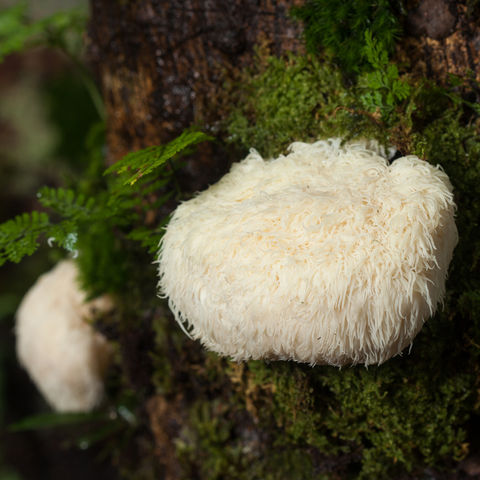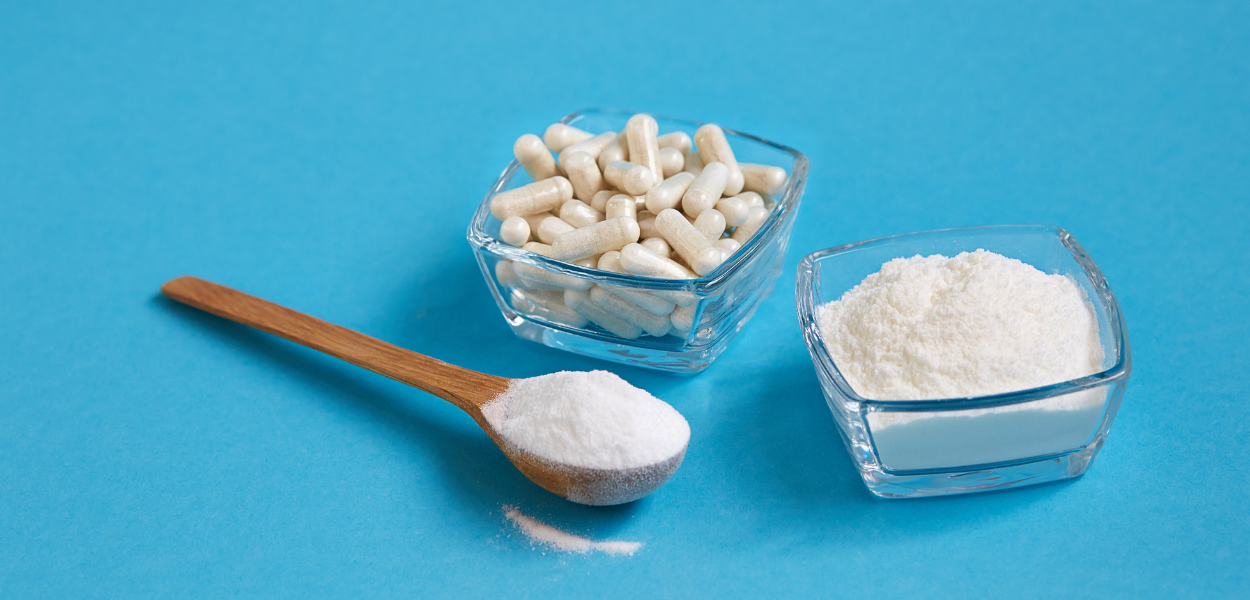Your Cart is Empty
FREE SHIPPING ON ALL ORDERS $75+
Lion’s mane mushroom is a functional fungi that’s earning some fame for it’s nootropic benefits. In fact, there are ancient accounts of it being used for improving cognitive function, as well as modern research that shows us it’s potential benefits for supporting Nerve Growth Factor (NGF) production, a protein responsible for supporting all facets of brain health.
It’s no surprise that everyone wants in on lion’s mane’s promised clarity and focus. The problem is, like all supplements in the U.S., mushroom supplements are unregulated. So, how do you choose the best lion’s mane supplement? The answer is–very carefully. Before you dive in, here’s everything you need to consider before choosing a lion’s mane supplement for your wellness regimen:
Looking for a tasty product that takes advantage of medicinal mushroom and nootropic ingredients like this? We recommend checking out Lucid Super Coffee.
Table of Contents
What is Lion’s Mane?
Why Take Lion’s Mane Supplements?
Whole Mushroom vs Extract
Fruiting Body vs Mycelium
Forms of Lion’s Mane Supplements
How to Check Lion’s Mane Quality
Conclusion: What’s the Best Lion’s Mane Supplement?
Lion’s Mane FAQs

The Lion's Mane mushroom, scientifically known as Hericium erinaceus, gets its name from it's white, full, hair-like appearance, which is easy to spot growing on hardwood trees in late summer and fall.
The Lion's Mane mushroom is used across the world, often as an "exotic" cuisine. For therapeutic purposes, however, it's more often found in supplement form because the raw mushroom has a short shelf life. There are various preparations available, and wellness experts and consumers often disagree about which is the most effective way to take Lion’s Mane. They have one thing right–not all lion’s mane supplement are made equal, and you definitely need the right one to reap this “mind mushroom’s” full benefits.
According to a mix of anecdotal reports and modern research, Lion’s mane is believed to have powerful benefits for supporting the brain and cognitive performance, balancing mood, and improving immunity.
How is this little mushroom so powerful? The answer lies in two main components–polysaccharides and terpenoids.
Thanks to these bioactive compounds (and more), the purported benefits of lion’s mane include:
Read Lion’s Mane Benefits to learn more.
Before you can choose a dosing style and narrow down to the best lion’s mane supplement, you need to consider the primary types of lion’s mane supplements available–whole mushroom products and extracts made from either the mushroom’s fruiting body or mycelial mass. It sounds like a lot of choices, but we’ll break them down:

Whole mushroom supplements usually come in powder form. This simply means that the entire lion’s mane mushroom is dehydrated and ground into a fine powder. This powdered version of the mushroom tissue may carry many of the super nutrients found in the fresh mushroom, making this a good way to take advantage of mushrooms’ superfood qualities.
However, this ground and powdered form is not a bioactive mushroom extract on its own. In this form, the bioactive compounds are still encased in the chitin layers and can’t be properly used by the body. Whole mushroom powder needs to be added to hot water to break down the chitin and create a bioavailable beverage that can be used by the body. This is somewhat of a disadvantage because you can only really consume these supplements as a mushroom tea or other hot beverage. Plus, the temperature needed to break down chitin and activate the therapeutic compounds varies, so it’s hard to be sure that you’ve properly prepared a whole mushroom supplement.
On the other hand, bioactive powdered mushroom extract is essentially the powdered version of this steeped mushroom material. In other words, mushroom extract powder is exposed to heat and “activated” during the production process, creating a product that’s ready to use. Extracts take full advantage of the lion’s mane’s beta-glucan content and are perfect for reaping certain benefits, like the adaptogenic benefits of mushrooms.
Additionally, both whole mushroom products and extracts can be made from either the mushroom's fruiting body or the mycelial mass. You can learn more about the differences by reading “Mycelium vs Fruiting Body: Which Mushroom Supplements are Best?”, but we'll briefly break down the differences:
The fruiting body is the cap and stem portion that most people usually think of when thinking of a mushroom. The mycelium grows underground and essentially functions as the mushroom's roots. Both parts are crucial to the production of mushroom supplements.
However, fruiting bodies contain 60-80% or more of the mushrooms total beta glucan content, while the mycelium contains much smaller amounts. Plus, mycelium is incredibly difficult to separate from the growing medium, usually a grain, which means that supplements made from mushroom mycelium often contain a lot of starch and are a more diluted version of mushroom supplements.
For most consumers, the difference is clear–mushrooms supplements made from the fruiting body are higher quality and contain more therapeutic compounds, but manufacturer rely on consumers’ misunderstanding to sell mycelium products that are degraded and overpriced.
As you work on deciding on the best Lion’s Mane supplement for you, you’ll also have to choose a supplement form. Lion’s Mane is available in multiple different forms and the type you choose will impact factors like the dosing method, dosage amount, bioavailability of certain bioactive compounds, cost, and more. Here are the most common types of Lion’s Mane supplements on the market, but beware–not all of them are made equal:

Mushroom powders are the most popular way to take mushroom supplements, including lion’s mane, and for good reason–they are incredibly versatile. Plus, a powder, especially one made from a mushroom extract (as opposed to a whole mushroom powder) is usually the most bioavailable option, meaning its chock full of the beta-glucans and other bioactive compounds found in lion’s mane mushroom, and it’s in a form that’s ready to use and easy for the body to digest.
Using a powder means that you can easily measure out your perfect dosage, and you can add it to a limitless array of smoothies, beverages, recipes, and more.
To add to that versatility, you can add mushroom powder to a capsule to make a dosing method that’s so easy, it’s almost thoughtless. This dosing method, while wonderful for lion’s mane extract, gets a little dicey when using whole mushroom powder.
Because whole mushroom powder contains bioactive compounds that are still locked away in the mushroom’s chitin, taking it in capsule form is virtually useless. You may still reap some nutritional benefits, but you won’t get the same therapeutic benefits.
Also, capsules make it more difficult to alter your dosage, so make sure you consider the dosing threshold before you buy lion’s mane capsules.
Lion’s mane tinctures are generally meant to be beta-glucan extracts. However, there’s a serious problem with most tincture formulas–they rely on alcohol extracts, and not all compounds in the mushroom are alcohol-soluble. So, unless the tincture uses a combination of hot water and alcohol extract and then refines that material to create a potent finished product, you may only be getting about half of the mushroom’s bioactive material.
If you do find a lion’s mane liquid that’s diverse and well made, you can incorporate it into morning cup of coffee or tea, protein shake, smoothie, or other recipes, or you can simply take it by mouth.
You’ve decided on a form and type of lion’s mane supplement–now how do you make sure that you choose a high-quality product?
The world of mushroom supplements can be difficult to navigate, and no product is ever going to tell you if it was poorly made or is lacking bioactive compounds. So, its up to you to learn how to identify a good, high-quality mushroom product. Here’s what you should consider:
For more information, check out this Health-Conscious Consumer's Guide to Buying Mushroom Coffee.

Although personal preference should be the primary deciding factor in choosing the best Lion’s Mane supplement, you also need to understand which types of supplements do and don't work best for therapeutic benefits.
If you want to get the most out of your Lion’s Mane dosing routine, look for a product made from Lion's Mane extract sourced from the mushroom's fruiting body. This type of supplement is most bioactive and bioavailable, meaning it'll have the most therapeutic benefits compared to any other type of Lion’s Mane supplement.
If you grab a Lion’s Mane extract powder, you'll be able to add it to virtually any food or beverage, which means you can do Lion’s Mane your way. Or, look for a mushroom blend to reap the synergistic benefits of Lion's Mane when paired with other functional fungi, like chaga, reishi, and more.
Your Lion’s Mane dosage will vary based on weight, diet, and other lifestyle factors. If you take Lion’s Mane with other functional mushrooms, you may need less Lion’s Mane each day to reap full benefits. Read “Lion’s Mane Dosage” to learn more.
Yes! In order to reap the most benefit from Lion’s Mane, you need to allow Lion’s Mane to have a systemic impact on the body. This happens with regular doses–ideally in the morning–which highlights the benefits of an extract powder than can be used in your morning beverages or your breakfast. Read “Best Time to Take Lion’s Mane” to learn more.
Lion’s Mane may take a few days to begin to take effect, and yo should notice full benefits after 1-2 weeks of regular dosing.
Comments will be approved before showing up.



